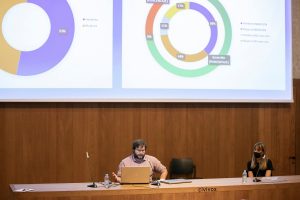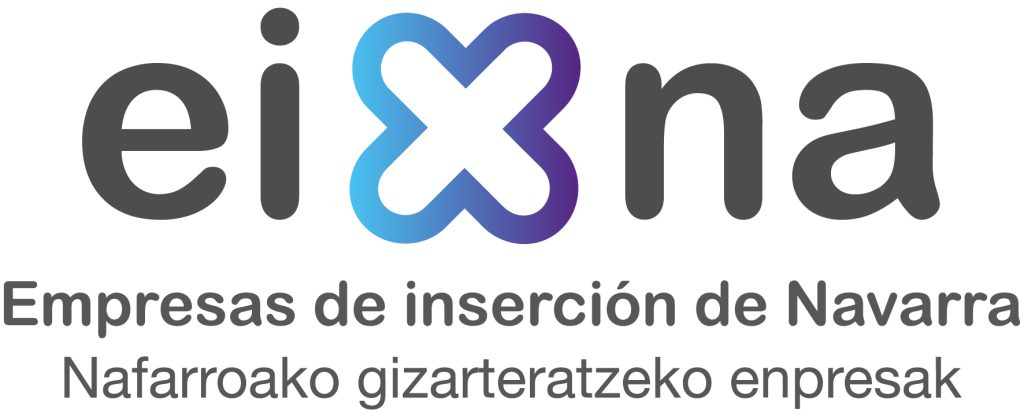On September 18 at the Condestable Palace of Pamplona-Iruñea, within the cycle of Economic Development Fridays, the Minister of Economic and Business Development, Manu Ayerdi, who together with the president of CEPES Navarre, Ignacio Ugalde, and the families of the Social Economy presented the balance of the First Comprehensive Plan of Social Economy.
Three months after the conclusion of the First Comprehensive Social Economy Plan 2017-2020, the objectives set have already been met, with 3,375 social economy jobs created and 324 new companies emerging during this time.
Navarra became the only European region in 2017 to have a tool such as the Comprehensive Social Economy Plan within its S3 strategy, with which to support associated work cooperatives; labor companies, agri-food cooperatives, insertion companies, foundations, solidarity economy entities and that are completed with special non-profit employment centers.
The document, prepared and developed jointly with the Provincial Government and by all the families of the social economy grouped in CEPES Navarra (ANEL, UCAN, EINA, Foundations, REAS and CEISNA), aimed to increase the number of people employed by at least 20% (3,300 jobs in absolute numbers) and to ensure that 10% of the companies created in Navarra were in the social economy, compared to the 7% they represented before the beginning of the plan. It was expected to create 300 companies and 324 have already been created.
The success of the Plan has been reflected in the numbers. If in 2015, there were 1,064 social economy companies, currently there are more than 1,250. And if they employed 16,430 people then, now there are more than 20,000. Among the jobs created in the social economy as a whole, the 2,498 correspond to direct jobs in cooperatives and labor companies stand out. In addition, in this time, the turnover of the sector has gone from 1,953 to 2,400 million euros.
“With this Plan the aim was to promote growth and strengthen the competitiveness of the fabric of Social Economy companies and to contribute to the increase in sustainable employment, to provide an innovative response to social needs and to the development of a more participatory and cohesive Navarrese society, and I think we have achieved it ”, said the counselor.
The development of a second plan already underway
During the event, in addition to analyzing the results of the Plan, several examples of good practices were also shown. In this balance, the counselor highlighted that the plan “has contributed to the improvement of the economy in general and the employability of people in Navarra”, a fact that, as he stated, “confirms the strategic importance of the social economy in the public policies of the Government of Navarre, and the collaboration between the different public and private agents ”.
All of this, the counselor stressed, represents “very good bases” to continue working on strengthening the Social Economy and making the sector a lever for development within the framework of the Reactivar Navarra / Nafarroa Suspertu plan. That is why the Department of Economic and Business Development, together with the Social Economy working group, has already begun to work on a second plan in which the families of the social economy and other Government Departments participate again, especially the Social Rights Department. “Once the usefulness and proper functioning of this planning tool for collaboration between different actors and the achievement of the set objectives has been verified, we commit ourselves and will decisively approach the preparation and development of the second Comprehensive Social Economy Plan”, he stated.
Sepaking about the data, Ugalde has highlighted the role of cooperatives and labor companies in the generation of wealth and “sustainable development” in Navarre, and has influenced that “they have generated employment in a greater proportion than the whole of Navarre in this period”. Ugalde has also highlighted the “effort, commitment and responsibility” of people linked to the social economy: “We are those who do not relocate, who stay and continue to reinvest at the local level, fighting to maintain employment, to seek shared solutions and to try that the crisis does not always hit the most vulnerable groups ”.
Region of reference
The role of the Social Economy in Navarra has led the Autonomous Community to become a reference region at the European level. So much so that, since 2018, it has led the European platform “Social economy to promote industrialization in the EU”. The proposal, coordinated by Navarra, has the presence of other regions and a Member State, Slovenia.
During these three years an important collaboration has been established at the European level that endorses Navarre’s strategic position in this matter, in line with the vision included in the plan of being the region of reference in social economy by implementation, by results, by social innovation and by policies to support the social economy.
Good practices
Among the different initiatives launched within the framework of the Plan, the counselor has highlighted the Social Innovation Unit (UiS) that has been established as an association at the beginning of 2020. It is a reference body to promote economic initiatives that generate a positive social impact in Navarre. “The creation of the UiS is a pioneering and transcendent action. There is no doubt that technological and business innovation is very valuable and necessary. But in order to build a new economic and social model, it is essential to complement it with social innovation processes. Social innovation plus technology is what allows results for society to be achieved. Furthermore, social innovation improves creativity, strengthens companies and work teams and, ultimately, contributes to the development of Navarre. ” On the other hand, he has also made mention of the work on the cooperative integration of the Navarrese agri-food sector with the Department of Rural Development and the main private agents of the sector and the Cross-Border School of Social Economy that has been created within the framework of the Aquitaine-Euskadi-Navarre Euroregion together with the cooperative organizations of the three regions to improve the employability and competitiveness of companies.

The conference was attended by Elena Sarasa, from ANEL, who analyzed the role of the social business economy. For her part, Arantxa Quintana, spoke about the scope of the founding sector in Navarra.
Edurne Arcelus, from REAS Navarra, presented the Geltoki initiative. which is a social market.
Por parte de EINA, el secretario técnico Xabier Berrade, presentó las cifras que en 2019 han dejado las empresas de inserción en su balance social, y un avance del estudio SROI que esta llevando a cabo la Asociación conjuntamente con la Universidad Pública de Navarra y financiado por el Observatorio de la Realidad Social de Navarra.
On behalf of EINA, the technical secretary Xabier Berrade, presented the figures that integration enterprises have left in their social balance in 2019, and a preview of the SROI study that the Association is carrying out jointly with the Public University of Navarra and financed by the Observatory of Social Reality of Navarra.
Ending the event, Patxi Vera, director of UCAN (Union of Agricultural Cooperatives of Navarre), has offered a talk on the Monetization of Social Value from the contribution of Cooperatives to the social value of the territory.
Photos and text by: economiasocialdenavarra.com
